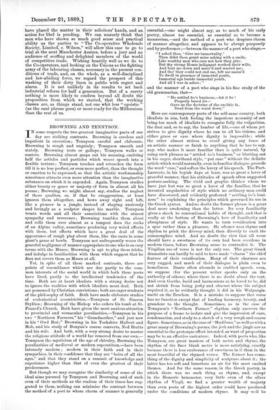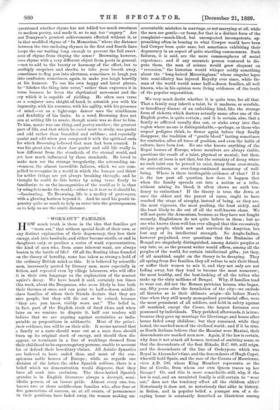BROWNING AND TENNYSON.
IN some respects the two greatest imaginative poets of our day are striking contrasts. Browning is careless and impatient in execution ; Tennyson careful and elaborate. Browning is rough and ungainly ; Tennyson smooth and stately. Browning trots or gallops ; Tennyson walks or canters. Browning almost gasps out his meaning, omitting half the articles and particles which weave speech into a flexible texture ; Tennyson touches and retouches the form till it is no less perfect, or even more perfect, than the thought or emotion to be expressed, so that the artistic workmanship sometimes attracts even more attention than the imaginative substance on which it is expended. Again, Tennyson studies either beauty or grace or majesty of form in almost all his poems ; Browning, we might almost say, studies the neglect of these qualites, or, if that be exaggeration, at least ignores them altogether, and hews away right and left, like a pioneer in a jungle, instead of shaping anxiously and lovingly as a sculptor shapes his marble. Tennyson treats words and all their associations with the utmost sympathy and reverence ; Browning tumbles them about and rolls them over almost as a tempest does the rocks of an Alpine valley, sometimes producing very weird effects with them, bat effects which have a great deal of the appearance of rough play about them, like the casts in some giant's game at bowls. Tennyson not unfrequently wears the graceful negligence of manner appropriate to one who is on easy terms with the Muses ; Browning is apt to play them tricks, and indulge in familiarities with them which suggest that he does not revere them as Muses at all.
Yet, in spite of all these marked contrasts, there are points of resemblance which are due partly to the com- mon interests of the social world in which both these poets have lived, partly to the intellectual tendencies of the time. Both are at heart idealists with a strong desire not to ignore the realities with which idealists must deal. Both are possessed by Christian convictions; both are eager students of the philosophy of faith. Both have made elaborate studies of ecclesiastical eccentricities,—Tennyson of St. Simeon Stylites ; Browning of the Bishop who orders his tomb at St. Pra,xed's Church. Both have given the most anxious attention to provincial and vernacular peculiarities,—Tennyson in his two "Northern Farmers," his "Grandmother," and just now in his " 0 wd Roii ;" Browning in his Yorkshire Halbert and Hob, and his study of Banyan's coarse converts, Ned Bratts and his wife. And both, with a very strong desire to master the religious attitude of a world far removed from our own,— Tennyson the mysticism of the age of chivalry, Browning the peculiarities of mediwval or modern superstition,—have been intensely modern ; modern in their faith and in their sympathies, in their confidence that they are "heirs of all the ages," and that they stand on a summit of knowledge and experience higher than that of even the greatest of their predecessors.
But though we may recognise the similarity of some of the ideal aims pursued by Tennyson and Browning, and of such even of their methods as the realism of their times has sug- gested to them, nothing can minimise the contrast between the method of a poet to whom charm of manner is generally essential,—one might almost say, as to much of his early poetry, almost too essential, so essential as to become a mannerism,—and the method of a poet who despises charm of manner altogether, and appears to be abrupt purposely and by preference ;—between the manner of a poet who sings,— " I asked thee, 'Give me immortality.'
Then didst thou grant mine asking with a smile, Like wealthy men who care not how they give. But thy strong Hours indignant worked their wills, And beat me down and mared and wasted me ; And tho' they could not end me, left me maimed To dwell in presence of immortal youth, Immortal age beside immortal youth, And all I was in ashes ; "
and the manner of a poet who sings in his fine study of the old grammarian, that— He settled STL'S business,—let it be ! Properly based Ora,— Gave us the doctrine of the enclitic 5e, Dead from the waist down."
Here are contemporary poets of the self-same country, both idealists in aim, both feeling the imperious necessity of not being too much of idealists to recognise fully the vulgarities, the dust and, so to say, the lumber of life,—one of whom yet strives to give dignity where he can to all his visions, and either grace or ease where dignity is impossible ; while the other almost strives to avoid giving any trace of an artistic manner or finish to anything that he has to say, nay, who makes it more familiar than is quite natural, by using such phrases as "settled i'ri's business," or blurting out in his eager, shorthand style, "put case" without the definite article which would naturally, even in familiar dialogue, precede the word "case," and soften the hurry of his speech. The Poet- Laureate, in his boyish days at least, was so great a lover of graceful manner, that his attitudes of speech often suggested posture-making. The vivid and graphic thinker whom we have just lost was so great a lover of the familiar, that he invented angularities of style which no ordinary man could have discovered, and evidently preferred "settling gTr's busi- ness" to explaining the principles which governed its use in the Greek syntax. And no doubt the former phrase is a great deal more awakening than the latter. Its very familiarity gives a shock to conventional habits of thought, and that is really at the bottom of Browning's love of familiarity and abruptness of style. He wants to turn versification into a spur rather than a pleasure. He oftener uses rhyme and rhythm to prick the drowsy mind, than directly to exalt the commonplace mind. And no doubt the view that all verse should have a sweetness of its own had been overdone in modern times, before Browning arose to contradict it. The Virgilian use of verse is not the only use. The great Greejt dramatists can hardly be said to have made " charm " the chief feature of their versification. Many of their choruses are very rugged, and much of their dialogue is plain even to homeliness. Dante often abounds in crabbed speech, even, we suppose (for the present writer speaks only on the authority of others), where there is no doubt about the text.
And even Goethe, lucid and harmonious as he loved to be, did not shrink from being jerky and obscure where his subject required it, as he evidently thought it did in his Walpurgis- nacht on the Brocken. It is a mistake to suppose that verse has no function except that of lending harmony, beauty, and grandeur to the thought. Sometimes, as in the case of Tennyson's "Northern Farmer," rhythm only answers the purpose of a frame to isolate and give the impression of care, condensation, and study to a sketch of a very rough and coarse figure. Sometimes, as in the ease of " Hudibras," as well as with a great many of Browning's poems, the jerk and the jingle are as essential to the grotesque effect intended, as want of proportion may be to an effective caricature. Indeed, with poets who, like Tennyson, are great masters of both metre and rhyme, the rhythm of the finer blank metre is more satisfying, exactly because there is less exuberance of sweetness in it than in the most beautiful of the rhymed verses. The former has some- thing of the dignity and simplicity of sculpture about it ; the latter has too soft and luxurious an air for the most exalted themes. And for the same reason, in the Greek poetry, in which there was no such thing as rhyme, and, except in the Homeric hexameter, very little even of the silver rhythm of Virgil, we find a greater wealth of majesty than even poets of the highest order could have produced under the conditions of modern rhyme. It may well be questioned whether rhyme has not added too much sweetness to modern poetry, and made it, so to say, too "sugary." Are not Tennyson's greatest achievements effected without it, or in that modified rhyme of "In Memoriam," where the distance between the two enclosing rhymes in the first and fourth lines keeps the ear waiting long enough to prevent the full sweet- ness of rhyme from cloying the sense ? Browning, however, uses rhyme with a very different object from poets in general, —not to add to the beauty or harmony of the effect, but to multiply surprises and shocks, to take your breath away, sometimes to flog you into alertness, sometimes to laugh you into confusion, sometimes, again, to make you laugh heartily at his humour. To use his own happy and latest phrase, he "hitches the thing into verse," rather than expresses it in verse because he loves the rhythmical movement and the cry which it is capable of yielding. He often uses verse as a conjurer uses sleight-of-hand, to astonish you with his ingenuity, with his resource, with his agility, with his presence of mind,—or as a tight-rope dancer uses the nimbleness and flexibility of his limbs. In a word, Browning does not aim at setting life to music, though music was so dear to him. To him, music was one thing, and poetry another; the greatest -part of life, and that which he cared most to study, was quaint and odd rather than beautiful and sublime ; and especially quaint and odd when you compared it with the spiritual ends for which Browning believed that man had been created. It was his great aim to show how quaint and odd life really is, how different from the standards of the eternal world, and yet how ranch influenced by those standards. He loved to make men see the strange irregularity, the astounding un- evenness, the almost incredible failures, which we are com- pelled to recognise in a world in which the hunger and thirst for nobler things are yet always breaking through ; and he thought he could do this better by using verse freely to familiarize to us the incongruities of the world as it is, than by using it to make the world,—either as it is or as it should be, —fascinating. To Browning, life is a medley of grotesques, with a glowing horizon beyond it. And he used his poetic in- genuity quite as much to help us enter into the grotesqueness, as to help us see the sunlit distance. '











































 Previous page
Previous page